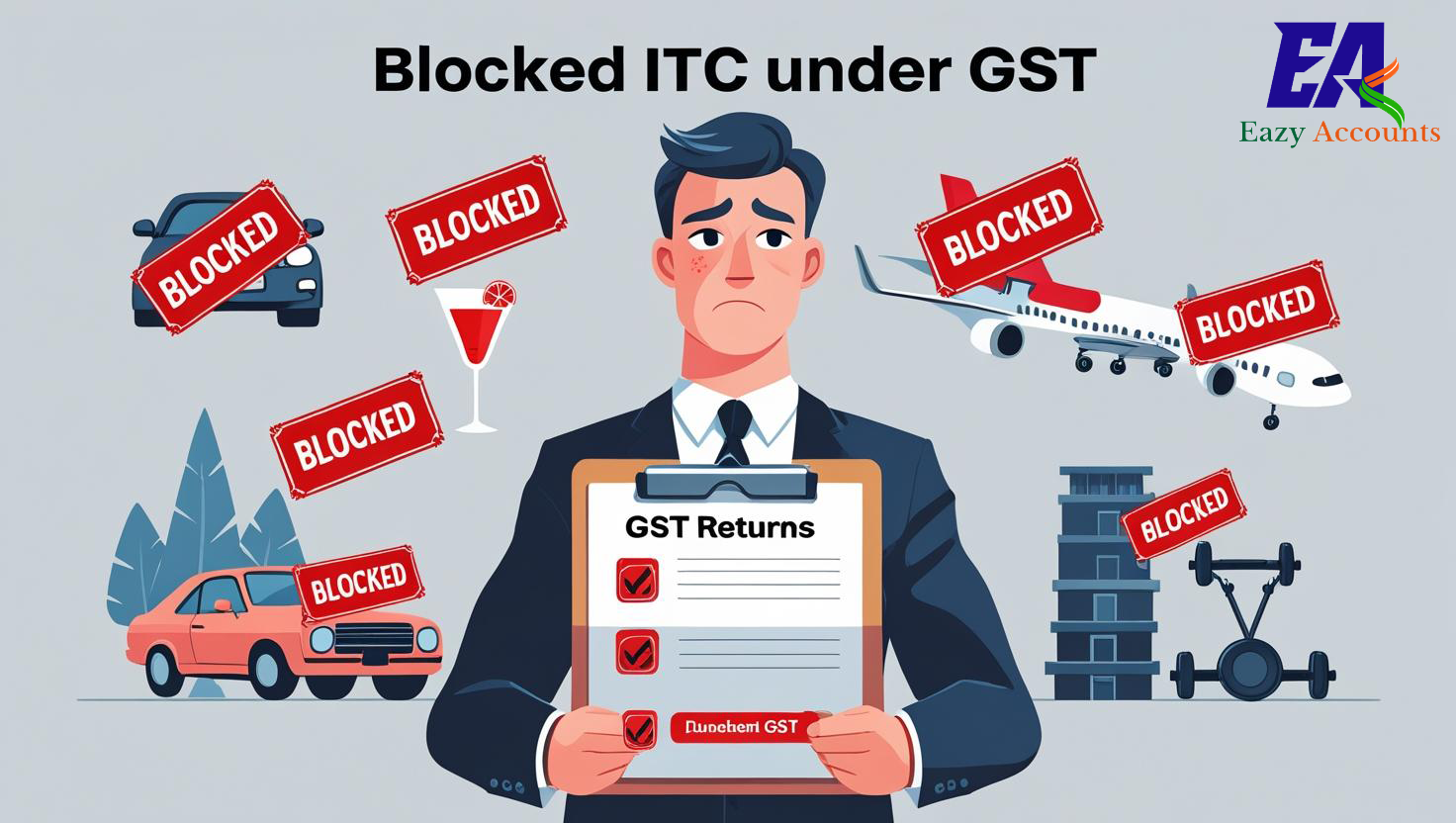
What is Blocked ITC?
In the world of GST, claiming Input Tax Credit (ITC) feels like a well-earned cashback. You pay tax on purchases, and the system lets you adjust it against your sales—fair deal, right?
But then comes Section 17(5) of the CGST Act, with a giant “NO ENTRY” sign.
This section lists down specific situations where Input Tax Credit is blocked—yes, even if the expense is for your business. The idea is simple: not everything you spend on helps you generate taxable output, and GST isn’t here to sponsor your lifestyle.
Let’s decode this section in clean language—along with practical examples and just a pinch of sarcasm.
Quick List: 8 Situations Where ITC is Blocked Under GST
- Motor vehicles for transporting people (under 13 seats)
- Food, beverages, and entertainment expenses
- Life insurance, health services, cosmetic treatments
- Club memberships and fitness centre fees
- Travel benefits for employee vacations
- Construction of immovable property
- Goods lost, stolen, destroyed, or given as gifts/samples
- Personal consumption or partly personal use
Lets understand in detailed:
1. Motor Vehicles for Personal Transport (Under 13 Seats)
You can’t claim ITC on motor vehicles used to transport people—unless the seating capacity is more than 13, or you’re in the business of selling, renting, or training people to drive them.
Allowed only if:
- The vehicle is used to provide taxable transportation services
- It has more than 13 seats (e.g., staff bus)
- You’re a dealer or you are running a driving school
Sometimes GST doesn’t care what the vehicle is used for—it only asks if you’re transporting more than13 people or just joyriding in the name of business.
Example:
Buy a 7-seater SUV for director visits? No ITC.
Buy a 20-seater staff bus for daily employee pick-up? Yes, ITC allowed.
2. Food, Beverages & Entertainment Expenses
Meals, drinks, party expenses, outdoor catering—all blocked, unless you’re in the business of supplying those services or legally required to provide them.
Example:
Office lunch meetings? Blocked.
Canteen service mandated by labour law? Allowed.
So, Whether it’s biryani for bonding or pastries for productivity—GST thinks you’re just eating up tax benefits.
3. Life Insurance, Health Services & Cosmetic Treatments
GST doesn’t care how healthy or beautiful your team looks—unless the law forces you, the tax credit isn’t yours. So, no ITC can be claimed on:
- Health or life insurance
- Medical expenses
- Cosmetic or plastic surgery
Exceptions:
- If required by law (e.g., ESI, group insurance)
- Or you provide those services yourself
Example:
Paid health insurance for staff? Blocked (unless law mandates it).
Botox for your CEO? Definitely blocked.
4. Club Memberships & Fitness Centres
Fees paid for joining:
- Clubs
- Sports facilities
- Gyms
- Lifestyle or networking bodies
→ then ITC is Blocked.
Example:
Golf club for client networking? No ITC.
Corporate gym plan for fitness? Still no.
So basically, You might join a club to build business, but GST assumes you’re building abs, not output tax.
5. Travel Benefits for Employee Vacations
Travel expenses paid for employee leaves, vacations, or rewards are not eligible for ITC—regardless of your HR policy.
Example:
Paid trip to Manali for your top sales team? Great gesture but ITC is not allowed.
GST doesn’t care how well you treat your staff—it only checks whether you’re sending them on tour or on holiday.
6. Construction of Immovable Property (Own Use)
ITC is not allowed on goods or services used for the construction of an immovable property, when such construction is for your own use—even if it’s for business.
Yes, you heard that right.
“Constructing your own office building?”
GST says: Congrats on the new space. But the credit? That’s blocked.
Exceptions:
- If you’re a real estate developer or construction company, and the building is meant for sale—then it’s part of your outward taxable supply, so ITC is allowed.
- For plant & machinery (careful, not everything counts)
Two Key Phrases That Decide Everything:
1. “Own Account”
If the construction is for your own use (your business premises), it’s blocked.
If you’re building it to sell or lease out, GST might allow ITC, subject to other conditions.
2. “Works Contract Services”
Even if you hire a contractor (not building it yourself), ITC is still blocked if it’s for your own immovable property.
Common Confusions – Let’s Clear Them:
- I hired a contractor for interior work—can I claim ITC?
→ No, if it adds to immovable property (walls, false ceiling, tiling, fixed furniture).
→ Yes, if it’s just movable stuff (office chairs, loose furniture, computers). - I renovated an old office, not constructed a new one. ITC?
→ If it involved capitalizing the expenses as part of the building—ITC blocked.
→ If it’s just repairs and you expensed it in P&L—ITC may be allowed. - What about leasing a property, then renovating it?
→ Still tricky. If the renovation is capitalized, even on leased property, ITC is blocked
But there is a twist for Plant & Machinery:
If you’re constructing or installing plant and machinery, then ITC is allowed, even if it’s attached to the ground. i.e. Setting up a cement plant? If it’s plant & machinery, ITC allowed.
But this does NOT include:
- Buildings or civil structures,
- Telecommunication towers,
- Pipelines laid outside the factory premises.
7. Lost, Stolen, Destroyed, or Gifted Goods
If goods are:
- Lost
- Stolen
- Destroyed in fire
- Written off in books
- Given as gifts or free samples
→ ITC is blocked.
Example:
Gifting branded mugs to clients? No ITC.
Inventory destroyed in fire? No ITC.
If your goods disappear—voluntarily or otherwise—GST disappears with your ITC. So, you have to reverse that ITC if availed.
8. Goods or Services for Personal Use
Any purchase or service that is wholly or partly for personal consumption—ITC is either blocked or proportionately disallowed.
Example:
Bought a chair for your home office that doubles as a gaming station?
ITC is not allowed.
Suppose, A business owner buys a Laptop for Rs. 1,00,000 + Rs. 18,000 GST.
and the Laptop is used:
- 60% for business
- 40% for personal use
Then you will entitled to get credit of 60% only, i.e. 18,000×60% = Rs. 10,800
However, You must maintain proper records to justify the business-use percentage. If it’s not reasonably measurable, GST officers may deny or disallow full credit during audit.
Final Thoughts:
Understanding Section 17(5) is crucial for every business, because not all expenses—no matter how justified they feel—are eligible for Input Tax Credit under GST.
Just because you paid GST doesn’t mean you can claim GST.
The law is crystal clear on what’s allowed and what’s blocked—and sadly, “but it was for business!” isn’t always a valid argument.
So before you file your next return or happily claim credit for that client lunch, office makeover, or team trip to Goa—pause. Ask yourself:
Will GST believe this adds value to my taxable output, or will it just block my enthusiasm—and my credit?
When in doubt, consult a tax professional (yes, someone like us) who can read the law between the lines—and prevent surprises during audit season.
